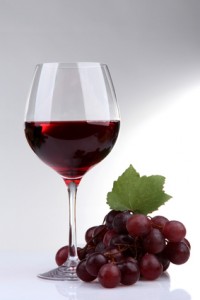What Does This Study Mean For You?
Author: Dr. Stephen Chaney
 Normally, I don’t discuss results from pilot studies. I wait until larger studies have been published in peer reviewed journals. But I thought this study might be of interest to you.
Normally, I don’t discuss results from pilot studies. I wait until larger studies have been published in peer reviewed journals. But I thought this study might be of interest to you.
Polyphenols from muscadine grapes and muscadine wine have been reported to reduce cellular aging. So, scientists from the University of Florida decided to do a pilot study asking whether muscadine polyphenols in the diet might improve signs of an aging skin. They reported their results in a poster (L Christman and L Gu, Dealcoholized Muscadine Wine Improved Skin Health, Reduced Oxidative Stress, and Inflammation in Women in a Randomized Controlled Trial, July 24, 2023) presented at the American Society for Nutrition’s NUTRITION 2023 meeting.
They enrolled 17 healthy women ages 40-67 to participate in a randomized, single-blinded, placebo controlled, cross-over study. Simply put, that means:
- The study started with a 7-day “run-in period” in which their diet was standardized.
- Then they were asked to drink 10 ounces/day of dealcoholized muscadine wine or a placebo drink for 6 weeks. Since participants did not know which beverage they were given, this is the “single-blind” part of the experimental design.
- This was followed by a 21-day “wash-out” period to allow muscadine polyphenols to be flushed out of their system.
- They then were switched to the opposite beverage for an additional 6 weeks. This was the “cross-over” portion of the experimental design.
Their skin conditions and blood markers of inflammation and oxidative stress were measured at the start (baseline) and end of each 6-week portion of the study.
When compared to both baseline and placebo, the dealcoholized muscadine wine significantly improved:
- Skin elasticity, which prevents the skin from sagging as it ages.
- Retention of moisture at the skin surface, which indicates the skin is providing a more effective barrier against aging.
- Skin smoothness.
- Blood glutathione peroxidase activity, a measure of antioxidant protection.
The authors concluded, “This randomized controlled trial demonstrated that consumption of polyphenol-rich dealcoholized muscadine wine improved skin conditions associated with aging. This is likely due to decreases in inflammation and oxidative stress.”
What Does This Study Mean For You?
 As for what this study means for you, I have two words, “Stay tuned”.
As for what this study means for you, I have two words, “Stay tuned”.
On the plus side, while muscadine polyphenols have been shown to reduce markers of skin aging when applied to the skin, this is the first study to suggest those same benefits may be seen from the inside out – i.e., from dietary muscadine polyphenols.
On the minus side, this is a pilot study. Pilot studies are meant to test hypotheses to see whether there is enough evidence to justify larger studies. In the words of the authors, “…repeating this study with a larger and more diverse group of people would help to confirm and strengthen the findings going forward.”
So, stay tuned. When the results of larger studies have been published in peer-reviewed scientific journals, I will give you an update.
The Bottom Line
Scientists at the University of Florida recently did a pilot study to see whether muscadine polyphenols in the diet might improve signs of an aging skin. When compared to a placebo, dealcoholized muscadine wine significantly improved skin elasticity, moisture retention, and smoothness. It also increased blood glutathione peroxidase activity, a measure of antioxidant protection.
The authors concluded, “This randomized controlled trial demonstrated that consumption of polyphenol-rich dealcoholized muscadine wine improved skin conditions associated with aging. This is likely due to decreases in inflammation and oxidative stress.”
On the plus side, while muscadine polyphenols have been shown to reduce markers of skin aging when applied to the skin, this is the first study to suggest those same benefits may be seen from the inside out – i.e., from dietary muscadine polyphenols.
On the minus side, this is a pilot study. Pilot studies are meant to test hypotheses to see whether there is enough evidence to justify larger studies. In the words of the authors, “…repeating this study with a larger and more diverse group of people would help to confirm and strengthen the findings going forward.”
So, stay tuned. When the results of larger studies have been published in peer-reviewed scientific journals, I will give you an update.
For more information on this study read the article above.
These statements have not been evaluated by the Food and Drug Administration. This information is not intended to diagnose, treat, cure, or prevent any disease.
___________________________________________________________________________
My posts and “Health Tips From the Professor” articles carefully avoid claims about any brand of supplement or manufacturer of supplements. However, I am often asked by representatives of supplement companies if they can share them with their customers.
My answer is, “Yes, as long as you share only the article without any additions or alterations. In particular, you should avoid adding any mention of your company or your company’s products. If you were to do that, you could be making what the FTC and FDA consider a “misleading health claim” that could result in legal action against you and the company you represent.
For more detail about FTC regulations for health claims, see this link.
https://www.ftc.gov/business-guidance/resources/health-products-compliance-guidance
